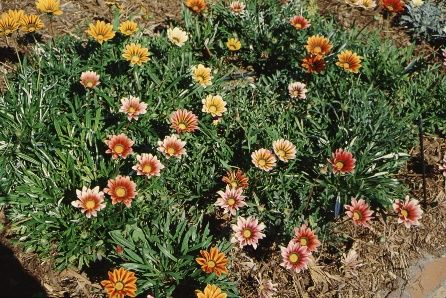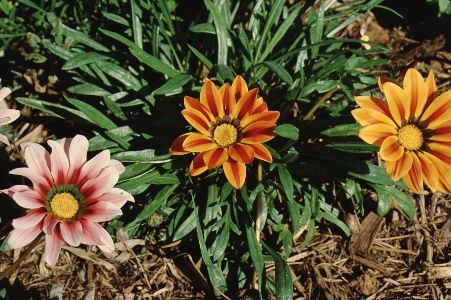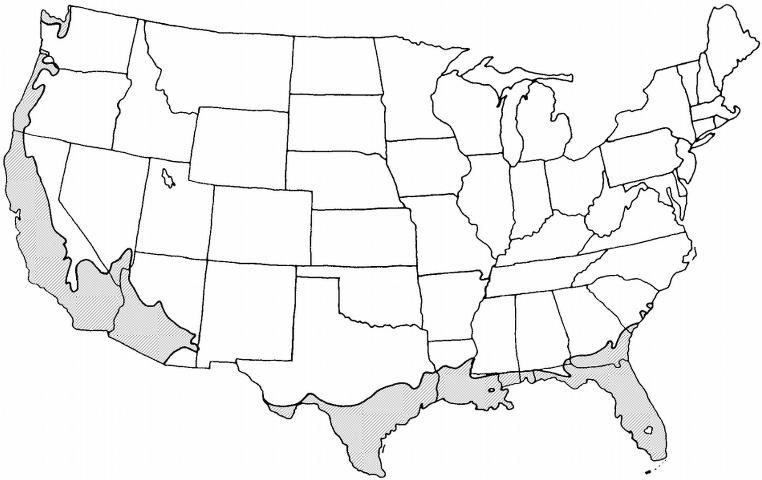Introduction
Gazania is a perennial grown as an annual that grows well in rock gardens or in other hot, dry areas. It forms a very low, ground-hugging ground cover, producing bright yellow, orange, or red, daisy-like flowers. The stripped petals set this group of hybrids apart from other gazanias. Flowers close at night and on very cloudy days. Plants grow 6 to 12 inches tall with bluish foliage. Do not plant in the partial shade. Full day sun is required for healthy plants.

Credit: Edward F. Gilman, UF/IFAS

Credit: Edward F. Gilman, UF/IFAS
General Information
Scientific name: Gazania x Harlequin Hybrids
Pronunciation: gay-ZAY-nee-uh
Common name(s): harlequin hybrid gazania
Family: Asteraceae
Plant type: ground cover; perennial; herbaceous
USDA hardiness zones: 8B through 11 (Figure 3)
Planting month for zone 8: Apr; May
Planting month for zone 9: Mar; Apr; May; Sep; Oct
Planting month for zone 10 and 11: Feb; Mar; Apr; May; Nov; Dec
Origin: not native to North America
Invasive potential: not known to be invasive
Uses: ground cover; edging
Availability: somewhat available, may have to go out of the region to find the plant

Credit:
Description
Height: 0.5 to 1 feet
Spread: 1 to 2 feet
Plant habit: round
Plant density: moderate
Growth rate: moderate
Texture: medium
Foliage
Leaf arrangement: most emerge from the soil, usually without a stem
Leaf type: simple
Leaf margin: lobed
Leaf shape: linear
Leaf venation: none, or difficult to see
Leaf type and persistence: deciduous
Leaf blade length: 4 to 8 inches
Leaf color: green
Fall color: not applicable
Fall characteristic: not applicable
Flower
Flower color: yellow; red; orange
Flower characteristic: year-round flowering
Fruit
Fruit shape: unknown
Fruit length: unknown
Fruit cover: unknown
Fruit color: unknown
Fruit characteristic: inconspicuous and not showy
Trunk and Branches
Trunk/bark/branches: not applicable
Current year stem/twig color: green
Current year stem/twig thickness: thin
Culture
Light requirement: plant grows in full sun
Soil tolerances: clay; sand; acidic; alkaline; loam
Drought tolerance: high
Soil salt tolerances: unknown
Plant spacing: 12 to 18 inches
Other
Roots: not applicable
Winter interest: no special winter interest
Outstanding plant: plant has outstanding ornamental features and could be planted more
Pest resistance: long-term health usually not affected by pests
Use and Management
Gazania is a good plant for erosion control in dry areas. It should be planted 12 to 18 inches apart to form a solid ground cover several months after planting. Good soil gives best growth, but the plant tolerates poor, sandy soil. Provide excellent soil drainage when growing this plant in the eastern part of the US. Gazania requires less water than most annuals or perennials. Full sun is preferred, and the flowers do not open fully on wet or cloudy days. Extended wet weather or poorly drained soil can promote disease which can kill portions of the plant. Removing the old blossoms may increase the number of blooms produced.
Pests and Diseases
No pests or diseases are of major concern, but gazania can be susceptible to root rot on wet or poorly drained soils.